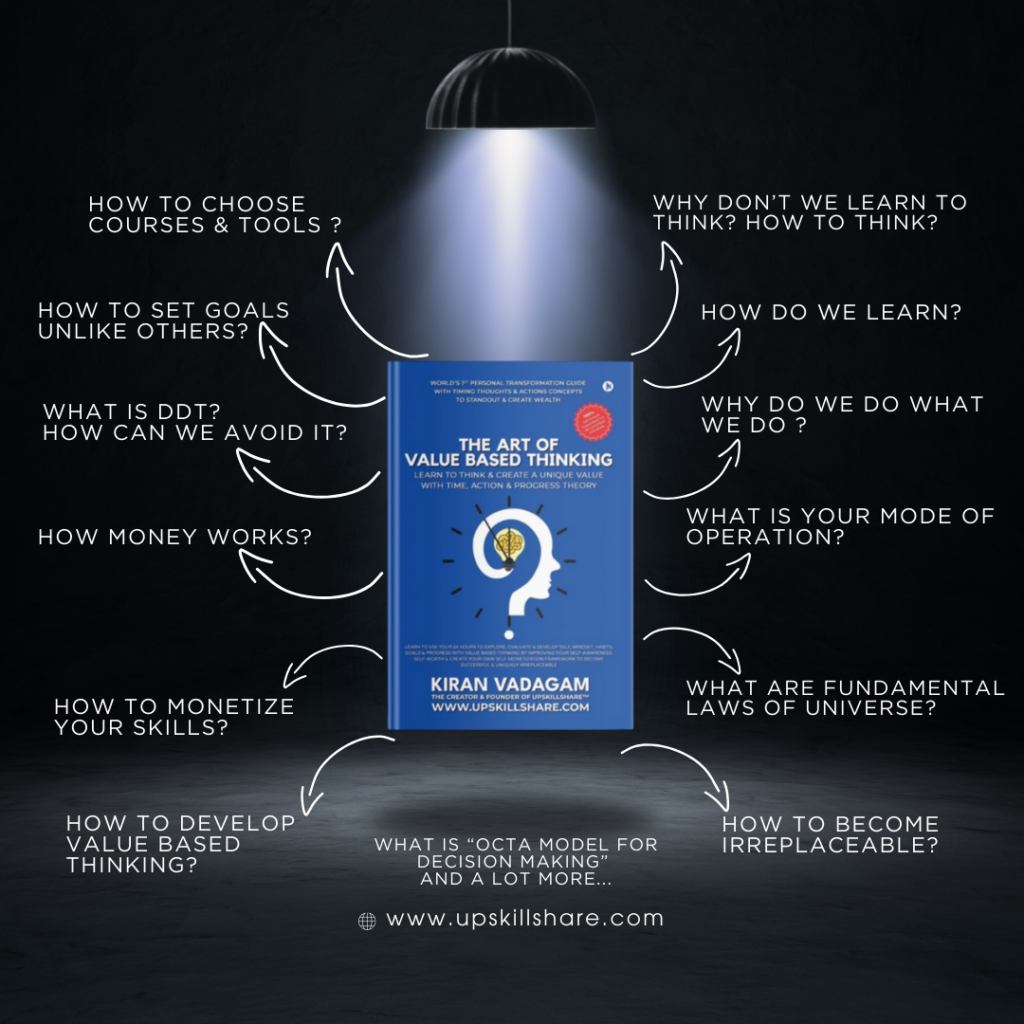Learning is a part of our life, but have you ever questioned why we don’t learn to think?
Our mind is constantly absorbing information, but most of it happens unconsciously. We react, follow routines, and make decisions without deeply analyzing our thought process. Schools and colleges teach us subjects, but they don’t teach us how to think—how to question, analyze, and make decisions that add value.
Why Don’t We Learn to Think?
- We Are Trained to Memorize, Not Think
- From childhood, we are rewarded for remembering answers, not questioning them. Thinking requires effort, but memorization is easier. Schools emphasize grades over real understanding.
- Fear of Being Wrong
- Most people avoid thinking deeply because they fear making mistakes. But mistakes are part of the process. Learning how to think means learning how to question, analyze, and improve.
- Lack of Self-Awareness
- Without self-awareness, we don’t recognize our own biases, habits, and patterns. This leads to impulsive decisions rather than well-thought-out actions.
- We Follow the Crowd Without Questioning
- We take thousands of decisions every day, yet most of them are influenced by what others are doing. When we never train our mind to think independently, we drown in the concept of following the crowd—chasing the same goals, making the same mistakes, and falling into the same problems.
- This keeps us engaged in entertainment, news, politics, and glamour—the distractions the majority follows. The first thing we need to ask ourselves constantly is: “Am I following the crowd? If yes, am I learning anything?”
- This is the application of Value-Based Thinking—a reminder that every decision and action should either create value for yourself or others in a positive way.
How to Think: Developing the Thought Process
The key to thinking effectively is Value-Based Thinking, as explained in The Art of Value-Based Thinking by Kiran Vadagam. It’s about being self-aware and making conscious decisions that add value—to ourselves and others. Here’s how:
1. Ask the Right Questions
- Instead of accepting things as they are, ask why, how, and what if?
- Example: Instead of “How do I get a job?” ask “How can I create more value so that opportunities come to me?”
2. Focus on Outcomes, Not Just Actions
- Every decision should have a clear purpose. Don’t just do something because it’s expected—ask “What value does this create?”
3. Train Your Mind to Think in Layers
- Instead of taking things at face value, break them down. What led to this? What are the possible outcomes?
4. Develop a Habit of Reflection
- At the end of each day, ask: What decisions did I make? What could I have done better? Reflection strengthens thinking.
5. Prioritize Learning Over Winning
- Value-Based Thinkers focus on progress, not just results. Even failures are valuable if they teach something new.
How The Art of Value-Based Thinking Helps in Conscious Decision-Making
Every action you take shapes your future. The Art of Value-Based Thinking teaches us to be fully aware of every decision before or during every action we take. By practicing conscious thinking, we can ensure that every minute of our life adds value.
- Every minute of our health increases or otherwise.
- Every minute of our wealth either increases or otherwise.
- Every minute of ours makes us either intelligent or otherwise.
- Every minute of us makes us happier or otherwise.
Each decision snowballs into a future shaped by today’s actions. A moment spent making a better decision leads to a better life, career, and relationships. By applying Value-Based Thinking, you can consciously choose growth, intelligence, health, and happiness every minute—instead of leaving it to chance.
Why Consciously Developing Thought Process is Crucial
If you don’t train your mind to think, someone else will think for you. Society, media, and outdated systems will shape your thoughts unless you take control. A strong thought process helps you:
- Make better decisions in life and career.
- Avoid impulsive choices that waste time and energy.
- Create more value, making you indispensable in any field.
- Improve problem-solving and become more resourceful.
The ART OF VALUE BASED THINKING – A Must-Read for Your Growth
Thinking is not automatic; it is a skill you must develop. The more you practice Value-Based Thinking, the better your decisions become. Start today by questioning everything you do: Does this add value? Could I do this better?
If you truly want to take control of your decisions and shape a better future, The Art of Value-Based Thinking is a must-read. This book reveals hidden aspects of thinking and decision-making that are never taught in school but are essential for personal and professional growth. Don’t let your future be shaped by unconscious choices—empower yourself with knowledge that can change your life.
🔗 Grab your copy today and start making smarter decisions for a brighter future!
Join our community on Personal Development:
🔗[https://upskillshare.com]Watch free book summaries to elevate your knowledge:📚🎥
🔗[https://upskillshare.com/self-improvement-free-book-summary/]Discover more inspiring books on Upskillshare: 📚🌈
🔗[https://upskillshare.com/progress-wall/]🌟📝 Follow me across social media platforms for more empowering content:
🔗 [https://www.instagram.com/upskillshare/]🔗 [https://fb.com/upskillshare]🔗[https://www.youtube.com/@upskillshare/]🔗[https://www.threads.net/upskillshare/]🔗[https://www.linkedin.com/company/upskillshare]Join our WhatsApp group for discussions and learning opportunities: 📲
[https://chat.whatsapp.com/GivF449KKcl0zCeb8MYokc]


